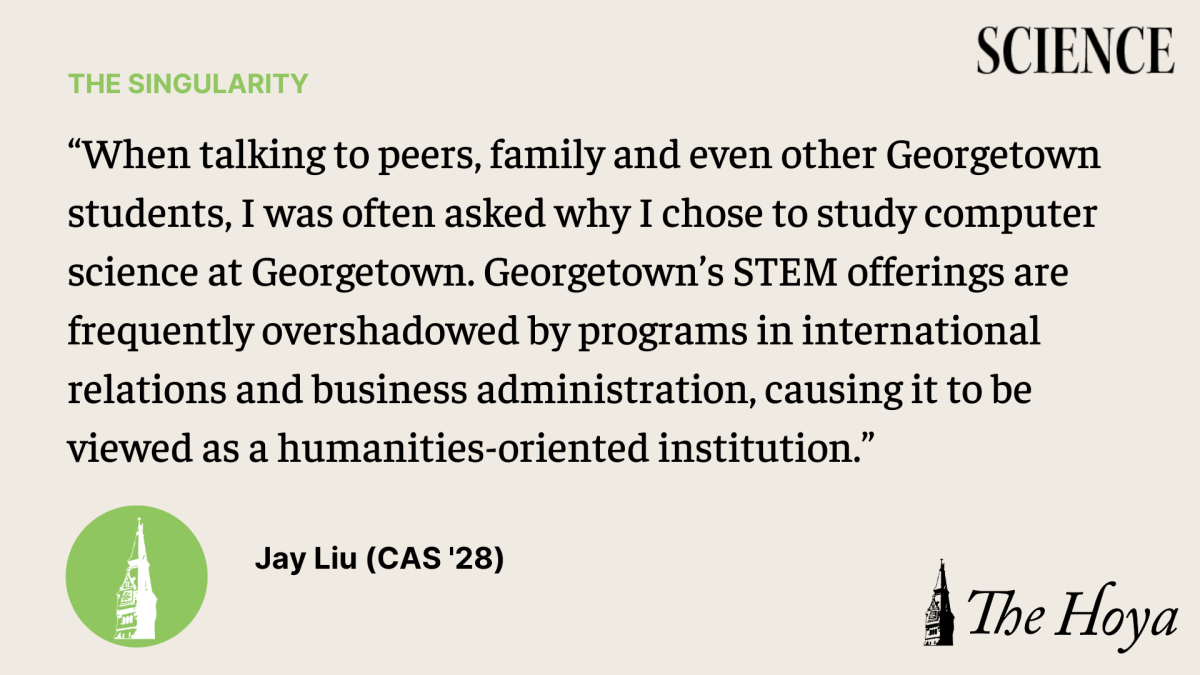
In this installation of his column “The Singularity,” Jay Liu (CAS ’28) discusses the absence of an engineering department at Georgetown and how it may be addressed.
U.S. News recently released its 2025 Best National Universities Rankings, and Georgetown University, ranked 22nd last year, fell to the rank of 24th. While these rankings are mostly superficial, Georgetown’s drop in the ranking nonetheless brings up important discussions about the gaps in its academic offerings. Namely, despite Georgetown’s status as an elite institution, it lacks an engineering department.
Education in science, technology, engineering and mathematics (STEM) has become increasingly emphasized by students and employers alike. From just 2017 to 2022, the number of students pursuing degrees in computer science, information science and related fields in the United States surged by 34%, while the number of students seeking degrees in English and history plummeted by 23% and 12%, respectively. Rising tuition costs and job market shifts have caused STEM studies to become more popular and in demand.
When talking to peers, family and even other Georgetown students, I was often asked why I chose to study computer science at Georgetown. Georgetown’s STEM offerings are frequently overshadowed by programs in international relations and business administration, causing it to be viewed as a humanities-oriented institution. Its US News Rankings in biology, chemistry and physics—at #58, #101 and #70—are significantly lower than its overall rankings.
At the same time, there has not been an urgent effort from the university to create its own engineering department. Engineering programs require substantial investment in advanced tools, equipment and facilities, such as computer numerical control (CNC) lathes and mills. Without them, students would not gain sufficient hands-on experience, especially in fields like mechanical and civil engineering. These requirements also occupy large spaces, something that’s increasingly difficult to find on the Hilltop.
Despite it being a major gap in Georgetown’s academic offerings, the establishment of engineering programs is and should be low on the priority list for Georgetown’s developments in the near future. The Georgetown University Campus Plan 2017-2036 provides no mention or proposal of any engineering-related projects. It instead focuses on improving spaces dedicated to student life and existing academic programs.
However, it is reasonable for Georgetown to not look into adding its own engineering programs for now. Georgetown offers multiple computer science, biology, chemistry and physics degree options, as well as interdisciplinary majors like biological physics.
As an alternative to an engineering department, Georgetown currently offers the Columbia Combined Program (CCP) to students from all undergraduate schools. This 5-year program awards degrees from both Georgetown and Columbia Engineering. With three years of education at Georgetown and two at Columbia, it offers a unique mix of a rigorous liberal arts education and robust, practical training in engineering. However, students have to relocate to another school to complete the program, which could be seen as a disadvantage.
To address Georgetown’s lack of engineering programs, the university could expand cross-registration options within the Consortium of Universities of the Washington Metropolitan Area. Cross-registration is currently allowed, but students are not readily informed of it. Increasing awareness of cross-registration could encourage interested students to access top-tier engineering education at schools like the University of Maryland, which is geographically closer to Georgetown and would, therefore, address a major concern about the CCP.
While this is only a band-aid solution, it would nonetheless help accommodate Georgetown’s lack of engineering options in a realistic and practical way.